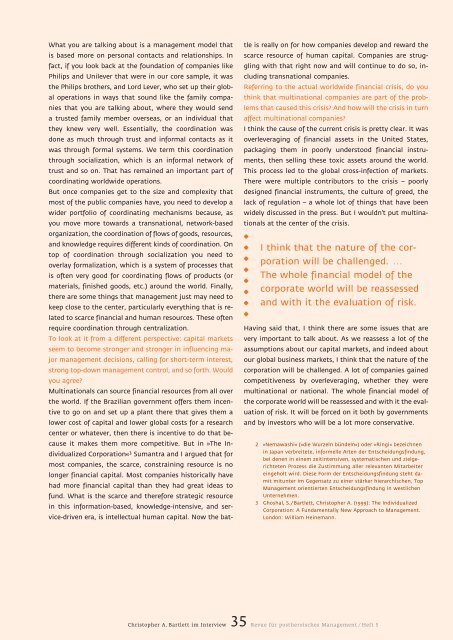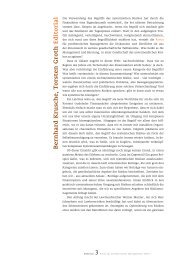K a trin G la tz e l E d ito ria l
K a trin G la tz e l E d ito ria l
K a trin G la tz e l E d ito ria l
Erfolgreiche ePaper selbst erstellen
Machen Sie aus Ihren PDF Publikationen ein blätterbares Flipbook mit unserer einzigartigen Google optimierten e-Paper Software.
What you are talking about is a management model that<br />
is based more on personal contacts and re<strong>la</strong>tionships. In<br />
fact, if you look back at the foundation of companies like<br />
Philips and Unilever that were in our core sample, it was<br />
the Philips brothers, and Lord Lever, who set up their glob-<br />
al operations in ways that sound like the family companies<br />
that you are talking about, where they would send<br />
a trusted family member overseas, or an individual that<br />
they knew very well. Essentially, the coordination was<br />
done as much through trust and informal contacts as it<br />
was through formal systems. We term this coordination<br />
through socialization, which is an informal network of<br />
trust and so on. That has remained an important part of<br />
coordinating worldwide operations.<br />
But once companies get to the size and complexity that<br />
most of the public companies have, you need to develop a<br />
wider portfolio of coordinating mechanisms because, as<br />
you move more towards a transnational, network-based<br />
organization, the coordination of flows of goods, resources,<br />
and knowledge requires different kinds of coordination. On<br />
top of coordination through socialization you need to<br />
over<strong>la</strong>y formalization, which is a system of processes that<br />
is often very good for coordinating flows of products (or<br />
mate<strong>ria</strong>ls, finished goods, etc.) around the world. Finally,<br />
there are some things that management just may need to<br />
keep close to the center, particu<strong>la</strong>rly everything that is re<strong>la</strong>ted<br />
to scarce financial and human resources. These often<br />
require coordination through centralization.<br />
To look at it from a different perspective: capital markets<br />
seem to become stronger and stronger in influencing major<br />
management decisions, calling for short-term interest,<br />
strong top-down management control, and so forth. Would<br />
you agree?<br />
Multinationals can source financial resources from all over<br />
the world. If the Brazilian government offers them incentive<br />
to go on and set up a p<strong>la</strong>nt there that gives them a<br />
lower cost of capital and lower global costs for a research<br />
center or whatever, then there is incentive to do that because<br />
it makes them more competitive. But in »The Individualized<br />
Corporation« 3 Sumantra and I argued that for<br />
most companies, the scarce, constraining resource is no<br />
longer financial capital. Most companies historically have<br />
had more financial capital than they had great ideas to<br />
fund. What is the scarce and therefore strategic resource<br />
in this information-based, knowledge-intensive, and service-driven<br />
era, is intellectual human capital. Now the bat-<br />
tle is really on for how companies develop and reward the<br />
scarce resource of human capital. Companies are strug-<br />
gling with that right now and will continue to do so, in-<br />
cluding transnational companies.<br />
Referring to the actual worldwide financial crisis, do you<br />
think that multinational companies are part of the problems<br />
that caused this crisis? And how will the crisis in turn<br />
affect multinational companies?<br />
I think the cause of the current crisis is pretty clear. It was<br />
overleveraging of financial assets in the United States,<br />
packaging them in poorly understood financial instruments,<br />
then selling these toxic assets around the world.<br />
This process led to the global cross-infection of markets.<br />
There were multiple contributors to the crisis – poorly<br />
designed financial instruments, the culture of greed, the<br />
<strong>la</strong>ck of regu<strong>la</strong>tion – a whole lot of things that have been<br />
widely discussed in the press. But I wouldn’t put multinationals<br />
at the center of the crisis.<br />
........<br />
I think that the nature of the corporation<br />
will be challenged. …<br />
The whole financial model of the<br />
corporate world will be reassessed<br />
and with it the evaluation of risk.<br />
Having said that, I think there are some issues that are<br />
very important to talk about. As we reassess a lot of the<br />
assumptions about our capital markets, and indeed about<br />
our global business markets, I think that the nature of the<br />
corporation will be challenged. A lot of companies gained<br />
competitiveness by overleveraging, whether they were<br />
multinational or national. The whole financial model of<br />
the corporate world will be reassessed and with it the evaluation<br />
of risk. It will be forced on it both by governments<br />
and by investors who will be a lot more conservative.<br />
2 »Nemawashi« (»die Wurzeln bündeln«) oder »Ringi« bezeichnen<br />
in Japan verbreitete, informelle Arten der Entscheidungsfindung,<br />
bei denen in einem zeitintensiven, systematischen und zielge-<br />
richteten Prozess die Zustimmung aller relevanten Mitarbeiter<br />
eingeholt wird. Diese Form der Entscheidungsfindung steht damit<br />
mitunter im Gegensa<strong>tz</strong> zu einer stärker hierarchischen, Top<br />
Management orientierten Entscheidungsfindung in westlichen<br />
Unternehmen.<br />
3 Ghoshal, S./Bartlett, Christopher A. (1999): The Individualized<br />
Corporation: A Fundamentally New Approach to Management.<br />
London: William Heinemann.<br />
Christopher A. Bartlett im Interview 35 Revue für postheroisches Management / Heft 5
















